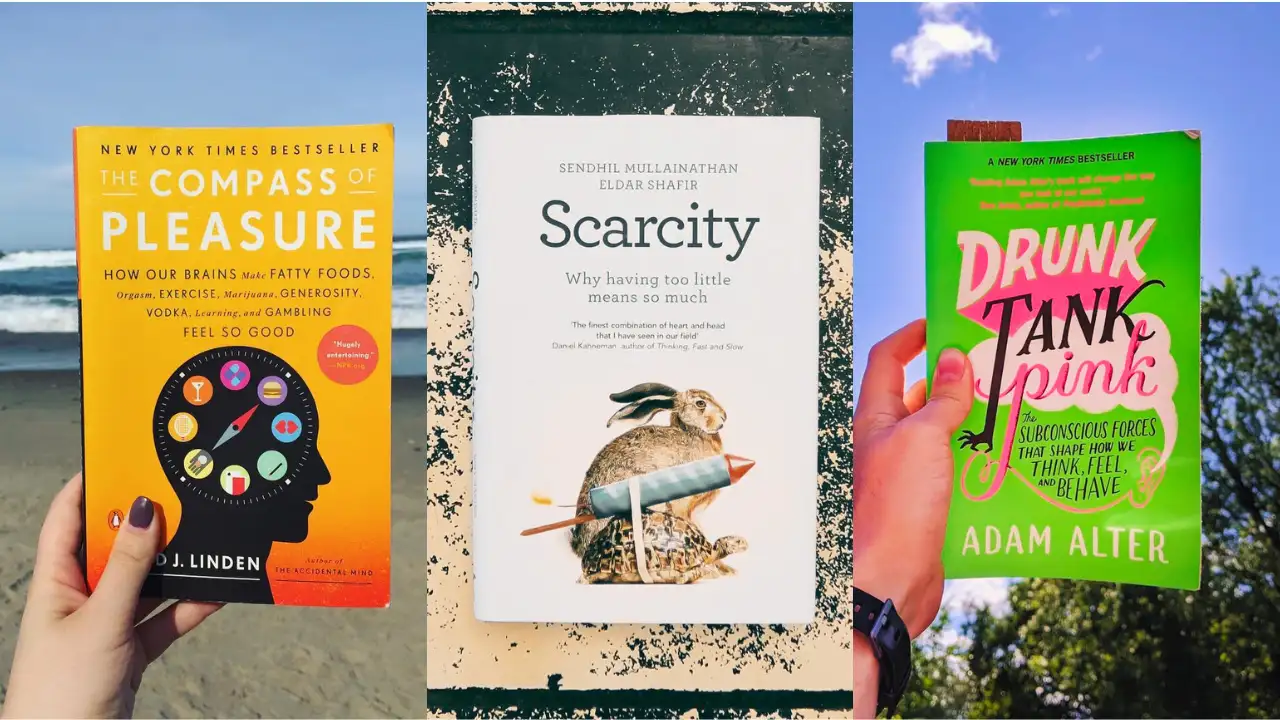Copyright timesnownews

Every choice, reaction, and routine hides a story your brain tells without asking you first. From the way you scroll your phone to how you argue or fall in love, psychology quietly scripts your life. These ten books pull back that curtain, revealing the real forces guiding your thoughts and actions. Each one challenges how you see yourself and others, showing that awareness, not perfection, is what truly reshapes the mind. Also Read: 10 Psychology Books That Quietly Shatter Mental Health Myths 1. The Blank Slate: The Modern Denial of Human Nature by Steven Pinker From birth, we inherit more than we realise. Our brains come with instincts that shape how we love, fight, and learn. In ‘The Blank Slate’, cognitive scientist Steven Pinker challenges the comforting idea that humans begin as blank pages shaped only by society. Through science, history, and humour, he argues that biology and culture work together to form who we are. The book challenges long-held beliefs about gender, morality, and violence, demonstrating that embracing human nature can help us build a more honest and compassionate world. 2. The Hidden Brain by Shankar Vedantam Every day choices often feel like conscious decisions, but they rarely are. Hidden mental patterns quietly steer whom we trust, what we buy, and even whom we love. In ‘The Hidden Brain’, journalist and scientist Shankar Vedantam uncovers how unseen biases guide human behaviour, from job interviews to justice systems. Through gripping stories and research, he shows that our minds often make choices before we even notice. This eye-opening book helps readers understand how invisible influences shape daily life and how awareness can change everything. 3. Scarcity: Why Having Too Little Means So Much by Sendhil Mullainathan and Eldar Shafir A shortage of time, money, or energy changes how the brain works. In ‘Scarcity’, behavioural economists Sendhil Mullainathan and Eldar Shafir show how having too little creates tunnel vision, trapping people in cycles of stress and poor decisions. Using research and real stories, they explain how scarcity shapes not only poverty but also daily struggles like overwork and distraction. The book argues that the human mind under pressure narrows focus to survive, often at a hidden cost. Understanding this helps explain why solutions must fit the limits people actually live with. 4. Mindwise by Nicholas Epley We like to believe we can read others easily, yet our guesses often miss the truth. In ‘Mindwise’, psychologist Nicholas Epley explores why humans misjudge what people around them think or feel. He uses clever experiments and familiar moments like misunderstanding a friend’s silence to reveal how the mind creates stories about others. The book explains how empathy, humility, and curiosity can bridge those gaps. Epley’s insights make readers question how well they truly know anyone, including themselves, and why small assumptions can lead to big misunderstandings. 5. How We Decide by Jonah Lehrer Every choice, from buying a phone to saving a life, begins in the brain’s hidden maze of logic and emotion. In ‘How We Decide’, science writer Jonah Lehrer blends neuroscience and storytelling to show how feelings and reasoning constantly compete to guide decisions. He explores what happens inside the mind of a quarterback, a pilot, or a shopper making a split-second call. The book reveals why, sometimes, trusting our instincts works better than endless analysis and why understanding how we make decisions can make our choices more thoughtful and confident. 6. The Compass of Pleasure by David J. Linden Pleasure drives nearly everything people do. In ‘The Compass of Pleasure’, neuroscientist David J. Linden explores how the brain turns love, food, success, and even danger into addictive experiences. He explains how the same chemical rewards that make us feel joy can also fuel obsession and self-destruction. Through witty examples and science, Linden shows how pleasure evolved as both a guide and a trap. The book makes readers see happiness as a biological loop, wired deep in our brains, and far more complicated than it appears. 7. Drunk Tank Pink: And Other Unexpected Forces That Shape How We Think, Feel, and Behave by Adam Alter A colour once used to calm violent prisoners inspired this fascinating book. In ‘Drunk Tank Pink’, psychologist Adam Alter reveals how unnoticed details like colours, names, weather, or signs quietly shape how people think and act. He shows that the pink of a wall, the sound of a name, or the tone of a label can change behaviour more than we realise. Using quirky experiments and real-life examples, Alter uncovers how the environment silently moulds personality. The book reminds readers that invisible surroundings often control choices more than free will does. 8. The Power of Bad by John Tierney and Roy F. Baumeister A single insult can sting longer than ten compliments. In ‘The Power of Bad’, science journalist John Tierney and psychologist Roy F. Baumeister explain why negative events leave deeper marks than positive ones. They explore how this bias evolved to protect us but now distorts modern life, from relationships to media consumption. Drawing on experiments and stories, they show how to counterbalance this bad effect by consciously focusing on the good. The book is a reminder that happiness often depends not on eliminating pain but on learning how to weigh it. 9. The Optimism Bias by Tali Sharot The future almost always seems brighter than logic predicts. In ‘The Optimism Bias’, neuroscientist Tali Sharot explores why the human brain leans toward hope, often ignoring risk. She combines neuroscience and psychology to show how optimism helps us recover, dream, and keep going, even after failure. Yet the same instinct can make people overconfident or blind to danger. The book offers a balanced view of how hope shapes memory, motivation, and health, proving that positive illusion is both our greatest strength and our biggest weakness. 10. The Undoing Project by Michael Lewis A friendship between two Israeli psychologists changed the world’s understanding of thinking. In ‘The Undoing Project’, writer Michael Lewis tells the story of Daniel Kahneman and Amos Tversky, whose research exposed how humans often act irrationally. Through stories of their partnership, Lewis shows how they discovered the mental shortcuts that lead to bias and error. The book reads like a mix of biography and science, revealing how personal connection fueled groundbreaking insight. It is a moving look at how friendship and curiosity reshaped modern psychology. Also Read: 10 Psychology Books That Explain Why We Act the Way We Do The most powerful change rarely begins with grand resolutions. It starts with a small pause before a reaction, a second of awareness before habit takes over. These books remind us that understanding our minds is not about control but compassion. When you learn how thoughts and emotions really work, life becomes less random and more intentional. Awareness turns the ordinary into insight and helps you live more consciously in a world that never stops moving.



